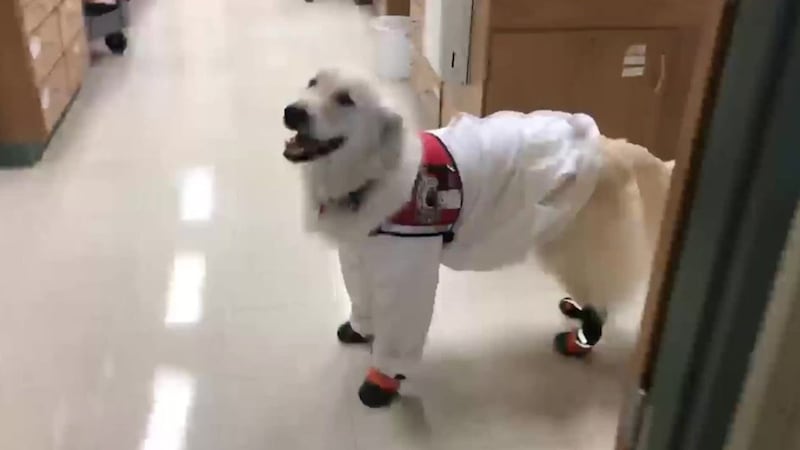Meet Sampson, the first-ever canine to be granted access to a chemistry laboratory at the University of Illinois.
The golden retriever service dog dons his goggles and custom lab coat every morning, just like his disabled neuroscientist owner, so he can help her conduct research, KRON reported.
I like sciencing! I wear the same PPE mom wears. Sometimes we don’t have to wear goggles. Those are days we are writing reports. I still help her everyday though. #servicedog in #science #neuroscience #research #laboratory #molecular #cellular #biology pic.twitter.com/S2TbYTheEu
— Sampson the Service Dog (@sampson_dog) October 9, 2019
Joey Ramp, 56, suffered traumatic head injuries following a serious 2016 horse-riding accident but returned to academia to gain a better understanding of the human brain, People magazine reported.
And Sampson, clad daily in his personal protective equipment, is right by her side every step of the way.
“If I drop something in the lab, he’ll come to my side, and I can use him as a brace to kneel down and pick up what I need,” Ramp told the outlet, noting Sampson is also on hand to spot signs of her post-traumatic stress disorder and react accordingly.
Ramp, a former horse trainer, damaged her prefrontal cortex and suffered permanent nerve damage to the left side of her body after a polo accident that caused 23 broken bones, including a fractured eye socket, cheekbone, two vertebrae, jaw and collar bone, People reported.
Nearly five years later, Ramp – with Sampson’s help – is pursuing her doctorate in neuroscience.
“I couldn’t possibly navigate academics or a neuroscience program without his assistance. There’s more focus on the dog than the service they are providing, and they were barring an entire population of students from entering lab work and ultimately the STEM field,” Ramp told South West News Service in Bristol, United Kingdom.
We're a team/partners. I'm a Service Dog. My girl is disabled, she's healthy/happy here. She is a scientist/researcher. She can do this because I do my job. If you see us ignore my floof, smile, say hello to her. She'll respond. Because she can, you already told me I'm a good boi pic.twitter.com/tRaXc2WWhU
— Sampson the Service Dog (@sampson_dog) March 8, 2021
In turn, Ramp began advocating for service dogs to be allowed into laboratory settings and even created guidelines to get more four-legged assistants in the pipeline. In addition to wearing the same PPE as humans, service dogs like Sampson must also remain in their handler’s direct line of sight at all times; have a rubber-backed mat on which they are trained to lie – removed from lab traffic – for up to four hours; and learn to retrieve things on command instead of automatically, People reported.
“I really want people to start understanding that service dogs have a very high level of training. They provide independence and keep their handler healthy, happy and able to go about life in ways they wouldn’t be able to do without their service dog,” Ramp told the outlet.
“People with disabilities do want to study science, and to look at people with disabilities and service dog handlers with a view of making things more accessible to them is really important and it’s time,” she added.
Cox Media Group







